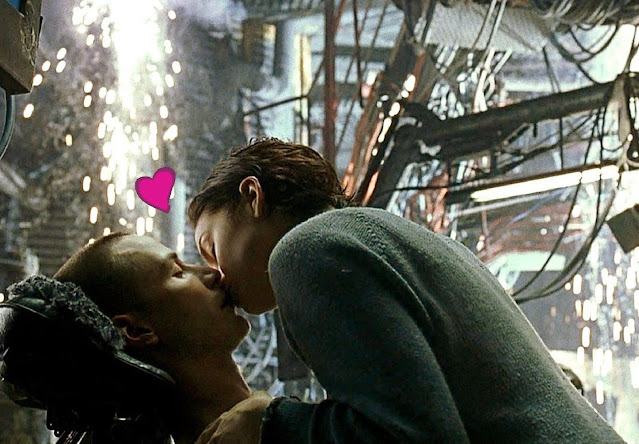The Matrix Movies are Some of the Best Love Stories Ever Written
by Levi Homman
Recalling the Wachowski sisters’ highly influential sci-fi fable The Matrix usually invokes images of slow-motion gunfire and an excess of black latex, but with time it’s easy to forget just how powerfully romantic the film is as well. Neo’s love interest Trinity (Carrie-Anne Moss) — perhaps after a first viewing – seems flat and unessential. The moments the film shows her falling in love with Neo are few and far between, and the catharsis of their relationship (forgoing the sequels) feels mostly unmerited.
And yet I can’t stop thinking about Neo and Trinity. I’ve seen the first Matrix film countless times; I adore its appeal to anarchy and straight-faced badassery and I silently cheer to myself every time Trinity says “dodge this.” It wasn’t until recently that the love story stood out to me. What makes it so compelling, I think, is the grand scale of love and the importance it holds thematically in the Wachowskis' script. Trinity is drawn to Neo in a way that feels massive and celestial; it’s a biblical love that transcends just these characters, and eventually (in no small part thanks to Moss’ performance) we as the viewers feel it too. This love story is a key part of the film’s storytelling, and it is far greater than a subplot.
The basis for feeling that love begins with buying into the theism of the film’s world. Neo is a Christ figure; he’s frequently referred to as “The One”, a mythologized figure that will save the remainder of humanity from the machines that now rule the world. He doesn’t believe it at first, but eventually he becomes The One, breaking the rules of reality and saving the world.
Neo is brought to a character named The Oracle, a gentle, omniscient old woman in order to get confirmation that he is The One. She tells him that he is not, which eventually leads him to the truth: he is, and thinking that he wasn’t was the only way he could live up to his potential. Morpheus says, “She told you exactly what you needed to hear. That’s all.” The Oracle’s foretelling functions more conventionally but in a similar fashion for Trinity. What The Oracle tells her is that she will meet her true love, and that man that she loves will be The One. What’s interesting about that to me is that it’s never clear which comes first, Trinity’s undying love for Neo or her belief that he is the world’s prophesied savior. Either way, the prediction fulfills itself, and she is inexplicably drawn to him. Her love is what allows him to win a crucial battle in the final moments of the film; her kiss restarts his heart.
It all feels a little hackneyed at first, but understanding this love story as something greater, of fate fulfilling its purpose on a grand religious scale makes the love feel so much stronger. This is built upon in the later films as well; Neo and Trinity’s first explicit sex scene is edited to be interspersed amongst images of the remaining humans on Earth dancing and sweating and getting close to one another. In The Matrix: Revolutions, it’s Neo and Trinity’s love that allows them to defeat the machines and conclude the Trilogy. In the newest Matrix, Resurrections, it is explicitly stated that Neo and Trinity must be kept apart by the antagonists because their love is too powerful. Their love expands outside of itself when it allows them to repeatedly defeat the machines; they love each other but they also love the human race. The love between Neo and Trinity is much more than a love between two people; it is a love between the messiah and his eternally bonded partner. It’s a love of community and wholeness that logically connects to the film’s aggressively leftist values, and it’s a love that plays a role that’s just as important as Neo himself. And even despite all that, their love feels human and real and grounded. It’s beautiful.
You can find Levi on Letterboxd or on his film review blog, Levi on Film!



Comments
Post a Comment